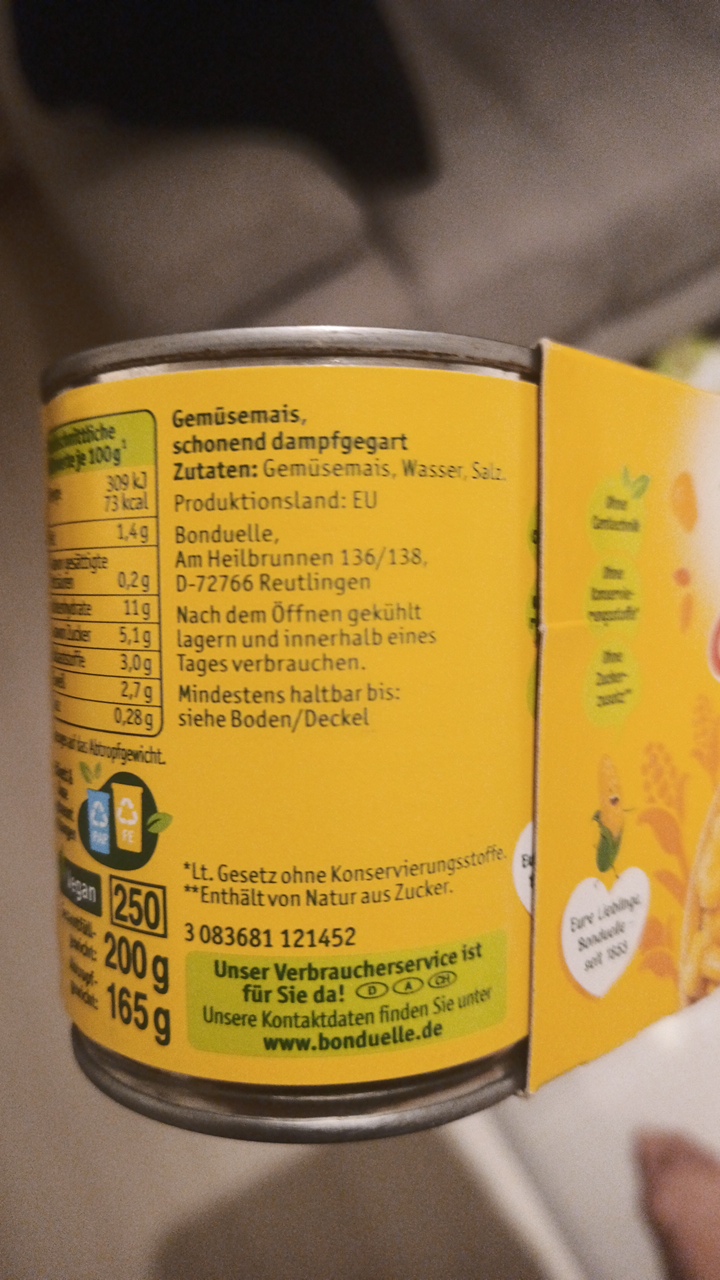
Barcode: 3083681117653
Gemüsemais
HALAL
📝 Reason: All listed ingredients—’gemüsemais’ (sweetcorn), water, and salt—are plant-derived or mineral-based, with no animal content, doubtful additives, or haram substances (such as pork, alcohol, or Haram E-codes like E120). According to Islamic dietary law (Quran 5:3) and reputable Halal certification sources, these ingredients are universally Halal. The absence of meat and E-numbers excludes any cause for doubt, and there is no need for specific Halal certification. (References: IFANCA, soundvision.com, www.ehalal.io).
🏷️ Category: Canned Corn
📄 Certificates: Vegan, 250, 200 G, 165 G, Vegetarisch, Vegan
Ingredients:
Details
Understanding the Halal Status of Gemüsemais
Halal dietary laws are essential for many people around the world, guiding their food choices based on Islamic principles. One product that deserves attention is Gemüsemais, commonly known as sweetcorn. Consumers may wonder, is Gemüsemais Halal? In this article, we’ll delve into its ingredients, E-numbers, and the overall Halal certification context.
Ingredients Breakdown
The ingredients of Gemüsemais are straightforward and include:
- Gemüsemais (sweetcorn)
- Wasser (water)
- Salz (salt)
All of these components are plant-derived or mineral-based, raising no concerns about animal content or questionable additives.
Evaluating Each Ingredient
Let’s explore each ingredient and its Halal status:
- Gemüsemais (Sweetcorn): Sweetcorn is a vegetable and is wholly plant-based. According to reputable Halal certification sources, such as IFANCA, sweetcorn is considered naturally Halal since it contains no animal by-products or E-numbers that could potentially be Haram. Furthermore, resources like soundvision.com and ehalal.io affirm the Halal status of sweetcorn, thereby eliminating any potential confusion.
- Wasser (Water): Water is universally recognized as Halal. This pure substance is free from any contaminants and prohibited materials, making it a safe ingredient in any food product. You can find more on its Halal status in Islamic dietary guides from sources such as soundvision.com.
- Salz (Salt): Sodium chloride or salt is another ingredient with a clear Halal status. Being mineral-based, salt does not contain any animal-derived components or illegal substances, ensuring its compliance with Halal dietary laws. Information regarding its status can also be verified through sources like soundvision.com.
Conclusion: Is Gemüsemais Halal?
Based on our in-depth analysis of Gemüsemais and its ingredients, we can confidently state that it is indeed considered Halal. The absence of meat, the presence of plant-based components, and the lack of any dubious E-numbers affirm its compliance with Islamic dietary laws. As there is no need for specific Halal certification based on the nature of its ingredients, individuals observing these dietary restrictions can enjoy Gemüsemais without concerns.
Contributing to a vegan and vegetarian diet, Gemüsemais has also garnered certifications in these categories, further solidifying its status as a wholesome, compliant food choice. If you’re seeking a delicious and worry-free addition to your meals, Gemüsemais stands out as an excellent option that aligns with your dietary needs.
